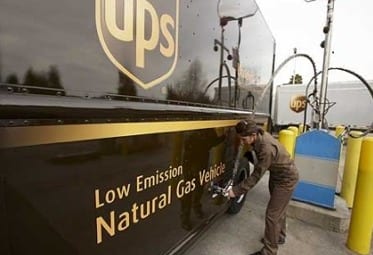Facing high gas prices, many field service organizations are getting creative and lowering their usage of gasoline by going mobile and cutting down on unnecessary driving. Electric vehicles and hybrids are available to consumers to some degree, but the cost of such vehicles, combined with the unique needs of field service, can be prohibitive. With large transportation companies starting to move to natural gas, it stands to reason that it could be a potential solution for field service as well.
 United Parcel Service unleashed 168 vehicles running on compressed natural gas (CNG) earlier this year, and recently launched a pilot program where 48 trucks will run on liquid natural gas (LNG). If you’re curious of the differences between CNG and LNG, a good explanation can be found here. The main takeaways: CNG (natural gas in gas form) costs less to produce and store than its liquid counterpart, while LNG is easier to transport over long distances.
United Parcel Service unleashed 168 vehicles running on compressed natural gas (CNG) earlier this year, and recently launched a pilot program where 48 trucks will run on liquid natural gas (LNG). If you’re curious of the differences between CNG and LNG, a good explanation can be found here. The main takeaways: CNG (natural gas in gas form) costs less to produce and store than its liquid counterpart, while LNG is easier to transport over long distances.
Another company with an extremely large fleet that’s putting an even bigger commitment to LNG is Waste Management. WM already has 1,000 of their 32,000 vehicles running on LNG; their plan is to spend $5 billion to convert the rest of their fleet to vehicles that run on a substance the U.S. has enough of to last 100+ years, according to some. WM says switching to natural gas will save $350 million on fuel costs annually, and lower vehicle maintenance costs will lead to further savings.
Of course, there’s a big difference between billion dollar corporations and most field service operations — many of which are small businesses that have to carefully budget for each time one of their vans/trucks needs even minor maintenance. While LNG is probably out of the question for field service at the current time, that doesn’t mean field service organizations aren’t turning to natural gas. Ford recently reported increased sales of CNG Transit Connect vans, boosted by low conversion prices and another obvious reason:
According to Motor Trend’s Zach Gale, fuel prices are a major impetus for the CNG momentum. Gale writes: “The consistent advantage of CNG’s appeal is the low price of fuel (and lower emissions). In the U.S. Department of Energy’s January Clean Cities Alternative Fuel Price Report for January 2011, the price per gallon equivalent of CNG was $1.93, compared to $3.08 for regular gasoline.”
That price difference between CNG and regular gas has widened in the months since, giving fleet managers another reason to consider switching. And with larger companies like UPS and WM moving over, another impediment to going “natural” — a lack of service suppliers — could soon be a distant memory. Kind of like low gasoline prices.

Share this: